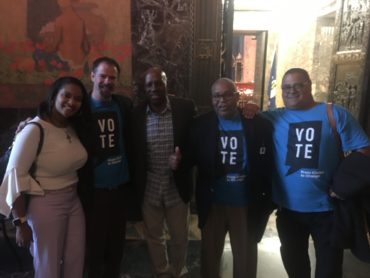May 10, 2018
Today, after years of work and an uphill battle for rights restoration, Advancement Project’s partner Voice of the Experienced (VOTE) reached a milestone: The bill they championed, HB 265, has passed the Louisiana House of Representatives.
HB 265 is a key part of VOTE’s fight for rights restoration. The bill would:
- Reduce the time people on probation and parole for conviction of a felony would have their voting rights suspended.
- Allow people with felony convictions to vote if they have not been incarcerated within the last five years. (Currently, people with felony convictions cannot vote while they are on probation and parole.)
- The bill would restore voting rights to people on probation who have not violated its terms and those on parole who have not been incarcerated for the past five years.
Now it’s off to the Senate, but this victory is worth highlighting. VOTE, after all, was started by formerly incarcerated people when they were behind bars. Theirs was a vision that people who are directly impacted are best positioned to claim their right to vote and improve their lives.
After their victory, VOTE said:
“This shows the value of showing up,” says Norris Henderson, executive director of VOTE, who began focusing on civic engagement while confined in Angola State Penitentiary decades ago. “We built a coalition, and the people we brought in brought in more people, more organizations, more political leaders. This final vote was a credit to the hard work of so many people, especially Representative Smith.”

Members of VOTE after their victory in the Louisiana House of Representatives.
VOTE’s full statement is below. Be sure to watch this space for updates on how Louisiana residents can help by calling members of the state senate and voicing their support for HB 265.
VOTE’s full statement:
After five years of advocacy and organizing, Rep. Patricia Smith’s bill to restore voting rights for people under community supervision passed the Louisiana House of Representatives, 61 – 39. The members of Voice of the Experienced (VOTE) rejoice today while continuing the work required to move this bill through the Senate, and to the desk of Gov. John Bel Edwards before the close of the legislative session.
“This shows the value of showing up,” says Norris Henderson, executive director of VOTE, who began focusing on civic engagement while confined in Angola State Penitentiary decades ago. “We built a coalition, and the people we brought in brought in more people, more organizations, more political leaders. This final vote was a credit to the hard work of so many people, especially Representative Smith.”
Just a few weeks ago, HB 265 lost 35-51, a disappointingly similar count to the loss in 2016. After calling for a reconsideration, the bill won a majority (51-41), yet failed to gain the 53 votes needed to pass. After getting a surprising third vote, the legislature had nearly flipped entirely.
The next step, a committee hearing in Senate Government Affairs, could come as early as Monday morning. If it passes there, then it could take a few days to get through the Senate Floor. The bill still restricts some people released from prison, but represents a massive change in Louisiana’s direction, considering it is America’s incarceration leader.
VOTE’s policy team is led by Checo Yancy, one of VOTE’s founding members, and Will Harrell, Senior Policy Counsel. They have been in the Statehouse every day during the legislative session.
Checo Yancy says, “We all just people, at the end of the day. And we’ve managed to connect with these politicians, and remind them about something that some folks take for granted: our vote, our citizenship, and what that means to ourselves and our families.”
VOTE is also a plaintiff in litigation to declare the disenfranchisement statutes unconstitutional. That case, VOTE v. Louisiana, should be heard in the Louisiana Supreme Court around the end of the year.
“If the legislature took the laws right off the books, our lawsuit would be a moot issue,” says Bruce Reilly, VOTE’s Deputy Director, a plaintiff, and member of the legal team. “But as long as they are disenfranchising anyone under community supervision, even for a limited period after incarceration, it is violating the clear intent of the 1974 state constitution.”